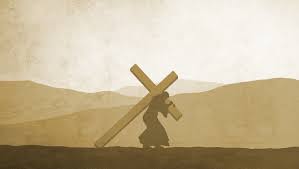Prophetic word released on April 11, 2022:
Reflecting on the Passion of Christ, the Man
We are entering the week leading up to Resurrection Sunday, often referred to as the Passion Week. Christ actually began experiencing the emotional pressure of what was coming several weeks before the Cross occurred. Most people fail to consider that Christ was truly human, with human feelings and emotions. Jesus endured pain (both physically and emotionally), experienced grief, sorrow, anger and disappointment; enjoyed friendships, knew joy and laughter, felt hunger and thirst, grew tired and sleepy. He was completely human, but without the Adamic fallen nature; He had to be in order to represent us as a legal substitute.
As one who was truly human, Christ didn't simply flip over into God-mode when things got tough in order to not experience the pain or trauma. Philippians 2:6-7 (emphasis mine) tell us that "...although He existed in the form of God, [He] did not regard equality with God a thing to be grasped, but emptied Himself, taking the form of a bond-servant, and being made in the likeness of men." Let Christ be human.
As I stated above, weeks before the Cross, Christ began feeling the pressure of what was coming. When He said, "...No one, after putting his hand to the plow and looking back, is fit for the Kingdom of God" (Luke 9:62), Jesus was thinking of Himself. The passage begins by saying, "Jesus let nothing distract Him from departing for Jerusalem because the time for Him to be lifted up drew near, and He was full of passion to complete His mission there" (Luke 9:51 TPT).
Jesus knew that in Jerusalem He would face arrest, torture, and agonizing death. But He set off firmly and unflinchingly, committed to finishing His mission. There would be no backing out, and nothing would deter Him from accomplishing His purpose. Isaiah prophesied of this determination:
"The Lord God has opened My ear; and I was not disobedient nor did I turn back. I gave My back to those who strike Me, and My cheeks to those who pluck out the beard; I did not cover My face from humiliation and spitting. For the Lord God helps Me, therefore, I am not disgraced; therefore, I have set My face like flint, and I know that I will not be ashamed" (Isaiah 50:5-7).
Christ knew this passage was about Him, and realized He was entering the season of its fulfillment. So He set His face like flint, put His hand to the plow, and turned toward Jerusalem. He was beginning what would become His final trek to this city. Traveling by foot, and stopping along the way to minister and rest, the journey would take several weeks.
 Luke, in his Gospel, reveals the humanness of Christ more than the other Gospel writers. Under Holy Spirit's guidance, each Gospel writer had a different goal in his writing. This is why each man shared different (not contradictory) accounts of Christ's works and different teachings. Matthew, for example, wrote his Gospel primarily to the Jews; he was, therefore, revealing Christ as the King of God's Kingdom. Mark wrote to Romans; hence, he wrote of Jesus as a man of action, filled with power and under authority. John wrote to all, presenting Him as truly God. Luke was writing to Gentiles and Greeks; he presented the humanness of Christ – He was truly a man, and therefore, qualified to be our substitute at the Cross. (Photo via Pixabay)
Luke, in his Gospel, reveals the humanness of Christ more than the other Gospel writers. Under Holy Spirit's guidance, each Gospel writer had a different goal in his writing. This is why each man shared different (not contradictory) accounts of Christ's works and different teachings. Matthew, for example, wrote his Gospel primarily to the Jews; he was, therefore, revealing Christ as the King of God's Kingdom. Mark wrote to Romans; hence, he wrote of Jesus as a man of action, filled with power and under authority. John wrote to all, presenting Him as truly God. Luke was writing to Gentiles and Greeks; he presented the humanness of Christ – He was truly a man, and therefore, qualified to be our substitute at the Cross. (Photo via Pixabay)
Luke wants us to know that from this point onward, the pressure began building in the Son of Man. Jesus was having to stay very focused in order to deal with this pressure. Eleven times after the above verse (Luke 9:51), Luke mentions that Christ was journeying toward Jerusalem, and therefore, the Cross. He was on a mission and wouldn't waver.
In chapter 12, Luke quotes Him as saying, "...I have a baptism to undergo, and how distressed I am until it is accomplished" (verse 50). "Distressed" is the Greek word "sunecho," and is a very strong word meaning, among other things, to be held fast like a prisoner. It means to be confined, constrained, and pressed together so as to not able to move (like a city under siege). Figuratively, it meant to be in a mental state of anguish.
Kenneth Wuest's expanded and very literal translation of the New Testament renders this verse: "I have an immersion by which I will be overwhelmed, and I am being hard pressed from every side until it be consummated." In other words, the strain was already very intense!
Jesus knew what was coming and was dreading it. The focus required in order to press on toward Jerusalem was so intense that it could be seen on His countenance. In Luke 9:53, Christ was rejected by a Samaritan village "...because His face was as though He would go to Jerusalem." There was great friction between Jews and Samaritans. However, Christ had earlier been accepted by a village in Samaria after ministering to the woman at the wells (see John 4). On this occasion, however, they would not receive Him. Why? They were offended because He couldn't seem to take His focus off Jerusalem.
There must have been many pensive gazes, perhaps even some grimaces, as Christ kept turning His face toward Jerusalem and the Cross. It became so obvious that the Samaritans, rejected and looked down upon by the Jews, finally had had enough. Of course, they didn't understand; no one did. This was something Christ would have to endure alone. With His face set like flint, He journeyed on, moving toward His destiny. "And He was passing through from one city and village to another, teaching, and proceeding on His way to Jerusalem" (Luke 13:22).
For several weeks, the journey continued and the pressure built, until Jesus rounded the last curve and crested the last hill. When the city came into view, He burst into tears. Christ's emotions were raw, sensitive, and bottled up. Like a pent-up dam that could take no more pressure, Christ let His emotions out. He loved the city; He loved the people; He loved us all. Yet He knew Jerusalem would reject Him and, in the future, experience great devastation. As this mix of emotions rose to the surface, Yeshua let it all out. And He did more than cry. Again, quoting from Wuest's New Testament "...having caught sight of the city, He burst into tears, weeping audibly over it" (Luke 19:41).
 What must the disciples and those following Christ have thought as He "burst into tears" and sobbed? How often this man surprised and amazed them. Power, authority, humility, wisdom, intellect, love and, yes, passion were all exhibited by this amazing Man – and they were about to see His anger. After composing Himself, Christ went straight to the temple and drove out those who were selling their wares, making His house of prayer "a den of robbers" (see Luke 19:45-46). (Photo via Pikist)
What must the disciples and those following Christ have thought as He "burst into tears" and sobbed? How often this man surprised and amazed them. Power, authority, humility, wisdom, intellect, love and, yes, passion were all exhibited by this amazing Man – and they were about to see His anger. After composing Himself, Christ went straight to the temple and drove out those who were selling their wares, making His house of prayer "a den of robbers" (see Luke 19:45-46). (Photo via Pikist)
This was indeed anger, but it wasn't a temporary loss of self-control. The temple pictured us humans – made to be the dwelling place/temple of God (1 Corinthians 3:16). The defilement Jesus was seeing reminded Him of the defilement in us, which He was about to cleanse, just days from now. He was symbolically showing what He had come to do: cleanse His temple – US! And Christ was intense about it.
Spend some time this week reflecting on the passion of Christ. Let's walk through the week with Him...Thank Him for the price He paid. Worship Him as not only the Creator but the Redeemer, and let Him be human.
Pray with Me:
Father, thank You for Your incredible love and commitment to us. Thank You for the Lamb that was slain from the foundation of the world. You are amazing. We are deeply moved by being able to call you Abba, Papa.
And, Jesus, thank You for the incarnation – being willing to become human. The Old Testament prophet called You Immanuel, "God with us." Thank You for the tears. Thank You for the love. Thank You for the suffering and pain. Thank You for the Cross; thank You for dying. And thank You for winning, for conquering death, for overcoming sin and its evil hold on us. Thank You for sharing Abba with us. Thank You for sharing Your throne with us.
Manifest Yourself through us in this era, we pray. May the world see who You are, Yeshua, and all of Your glory, as the Church You are building matures into the Ekklesia You envisioned. Continue to mature us into a people worthy of who You are. Amen.
Our decree: We declare that the sufferings of Christ were not in vain, and His Blood will never lose its power.
(To watch this full word, click here.)
Whatever you do, don't miss another ELIJAH LIST email! Subscribe at this link: elijahlist.com/subscribe.
Dutch Sheets
Dutch Sheets Ministries
Email: click here
Website: dutchsheets.org
Dutch Sheets is an internationally recognized author, gifted teacher, and conference speaker. He travels extensively, challenging believers for passionate prayer and societal reformation. Seeing America experience a sweeping revival and return to its Godly heritage is Dutch's greatest passion. Dutch has written over 23 books, many of which have been translated into over 30 languages. His international bestseller, Intercessory Prayer, has sold over 1 million copies worldwide. Dutch has pastored, taught in several colleges and seminaries, and served on the board of directors of numerous organizations. He is fondly known to many as Papa Dutch. Treasuring time spent with their family and grandchildren. Dutch and Ceci, his wife of 40 plus years, enjoy quiet walks in the woods, reading, and playing a little golf. They make their home in beautiful South Carolina.
To receive more words like this in YOUR inbox, subscribe FREE to the Elijah List at this link: elijahlist.com/subscribe.
Find us on:
* Facebook click here
* XAPiT click here
